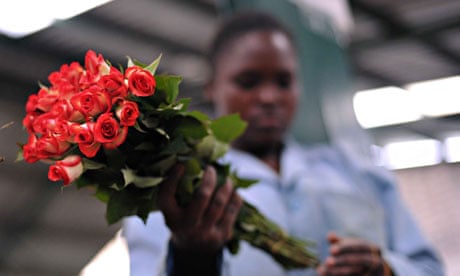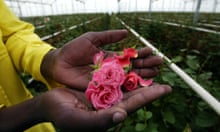The flower business is a lucrative one, worth more than £1.5bn a year in sales in the UK alone, and Kenya is one of the world's largest exporters of cut stems. This sort of export-led growth has been at the heart of international development policy for decades. But questions are now being asked about how much of the taxable profit actually stays in Kenya.
The head of domestic taxes at the Kenya Revenue Authority (KRA), John Njiraini, said late last year that he was investigating the flower sector, including the three largest multinational producers – Oserian, Karuturi, and Flamingo/Homegrown – based around Lake Naivasha.
He told local reporters that he suspected that parts of the industry might be shifting profits to other jurisdictions to dodge Kenyan tax, whether legally or illegally.
If you look at the average price at which flowers are exported from Kenya and the average price at which they are imported into Europe, there does appear to be a large gap which cannot be accounted for by transport costs alone.
In 2009, according to the UN's commodity trade data, the average price Kenya received for its flower exports was $3.70 a kg, whereas the average import price in Europe was $8.08 a kg. Transport costs are around 2.5% of the price a kg. Christian Aid's economist, Alex Cobham, calculates that this gap suggests Kenya may be losing as much as $500m (£312m) a year on its flower exports in this flight of capital to northern countries.
About 60% of international trade now consists of internal transfers within multinational companies, according to the Organisation for Economic Co-operation and Development (OECD). When multinationals trade internationally with their own subsidiaries they use a mechanism called transfer pricing. Sales of goods and services between parts of the same company are meant to take place at the open market price, at an "arm's length price". In practice it can be very hard to determine an open market price and by shifting ownership of research and development, marketing, brands, finance and logistics to different jurisdictions, multinationals can engineer their finances to their tax advantage.
"We have seen cases of multinationals reporting losses in Kenyan subsidiaries while their parent firms are making huge profits. We are investigating whether they have abused their transfer pricing policies," Njiraini told local reporters. Tax dodging in the flower sector is, however, a sensitive subject in Kenya. Several of the political elite have financial interests in flower farms. We asked to interview Njiraini but he was unavailable.
It is not the first time the sector has come under investigation. In 2004 one of Njiraini's predecessors, Jack Ranguma, also began to look at the accounts. He too was suspicious that flower companies were reporting losses in Kenya while foreign investors remained eager to buy into the industry.
"There are many ways in which multinationals engage in aggressive tax planning and avoidance. I suspected under-invoicing of sales out of Kenya, and over-invoicing of expenses charged to Kenya which both reduce taxable profit in Kenya. I was looking at other intracompany arrangements that shifted profits to other jurisdictions such as management fees between subsidiaries, and interest rates charged for intracompany loans," he told us.
Ranguma, who is now part of the Tax Justice Network in Africa, admits he cannot be certain the multinationals were dodging tax because he retired before his investigation was complete and work seemed to grind to a halt afterwards. He says he was hampered by the fact that the KRA lacked the expertise of international tax lawyers and accountants available to the multinationals.
Private companies are not obliged to publish accounts in Kenya, and so it is not possible to track how much tax they pay and where. Consolidated accounts published in the countries where their ultimate parents groups are registered do not give a breakdown either.
Our examination of the accounts of Flamingo/Homegrown's corporate structure does not suggest the use of offshore subsidiaries, but other flower companies do have tax-haven structures. Oserian sells to UK supermarkets including Tesco and Sainsbury's. Its Kenya company and the group's UK holding company are subsidiaries of Mavuno group in Liechtenstein. Mavuno also has a logistics company based in the low-tax jurisdiction of Dubai. We asked Oserian whether this structure was used for tax planning, but the director of administration for the Kenya company, Ruli Tsakiris, said that neither he nor the chairman of his group wished to comment on the investigation by the Kenya tax commissioner nor on the corporate structure involving Liechtenstein and Dubai. He referred us instead to the comments below from the Kenyan Flower Council.
Sher Karuturi supplies the majority of its Kenyan flowers for auction in Europe. Its Kenyan operations include a network of companies ultimately owned in India through a holding company in Dubai. That company was used as an investment vehicle for acquiring the Kenya operations and carries out all its Kenya business's marketing, according to its website. It did not respond to our requests for comment.
Flamingo/Homegrown is now part of the Swire group and is the main supplier to M&S. Its Kenya companies and group structure are all held beneath a UK holding company, which would make it subject to the UK's controlled foreign company rules for tax purposes.
Its director of sustainable business, Richard Fox, told us: "The Flamingo group is a business that has grown out of Africa. We have always paid what we believe was the right amount of tax and we now follow OECD guidelines for how transfer pricing should be managed and so we feel we are doing what we should do. I would say we leave a very substantial part [of the profit we make] in Kenya because there is significant investment for continual renewal and replanting, so a lot of it has to come back to Kenya to finance [that]."
The Kenyan Flower Council is the trade body for both large and small flower exporters. Its chief executive, Jane Ngige, said the government investigation was welcome but until it was concluded assertions about its tax contribution were speculation. "The industry is perceived to be very well heeled, but it is highly capitalised, there has been huge investment, today very few of those farms will make profit beyond 5%. It is very good the government is interested in where the money goes, but until we do a comprehensive value chain analysis we really cannot make those kind of pronouncements."
Additional research by Richard Brooks


